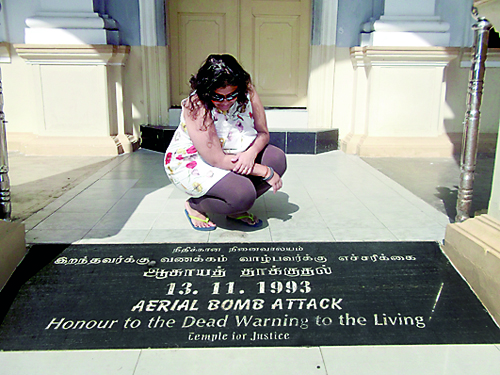Labels and signs of our life times
View(s):We Sri Lankans too often can’t resist defying signs. Confronted with a sign that says ‘Do!’ or ‘Don’t!’, we submit reluctantly sometimes; at other times rebelliously subverting its instructions. Token signage, traffic symbols, and graphic behaviour regulators are no  exception.
exception.
“Don’t cross!” is a red flag to many bovine pedestrians, whose bull-like rush against the little-red-man flashing red-light is a common sight on Colombo’s walkways, streets, roundabouts. “No parking!” is an invitation to treat for too many motorists for comfort, for cops and conscientious road-users alike. And the amber light with its ambiguous ambience provokes testosterone-fuelled drivers to rev up and accelerate to try and beat the traffic signals. When everyone sane enough to have ignored the road-rules knows that amber is code for “Stop!” (Yes, dear, really; not “Speed up and scrape past incoming cross-traffic by the skin of your teeth!”)
I fault the unattractive appearance and general meaninglessness of many notices. In Colombo’s tree-lined boroughs and grime-smeared suburbs, commuter- and consumer-oriented signage has to be seen and interpreted through the myopia-inducing lens of smog, avian excreta, and the dust beneath the wheels of politico-conveying chariots. En route to the outstations, one encounters speed-limits ‘on’ and speed-limits ‘off’ signs in the most unexpected places. ‘On’ – in apparently unoccupied areas (unoccupied that is, except for the local constabulary on the lookout for an opportunity to entrap, er, enforce, the law on unwitting marks, um, motorists). ‘Off’ – just after your latest brush with the aforementioned local cons!
On a recent visit to Jaffna and its peninsular environs, some public signage had us scratching our collective heads and wondering what target audiences were intended by the purveyors of such gems. “The use of fealty words in this holy place will be fined.” Fealty? “This is not a private place. It is a bathroom. Keep it clean. And tidy for the next person.” Public toilets not an oxymoron? “Folks eat here. Be on your best behaviour.” How badly can one behave on a steadying diet of weary lentils and lagoon water? Maybe the bottled drinks should have labels that say, “Shh, don’t mention the war!” – à la Basil of Fawlty Towers fame…
 Now don’t get me started on labels. (It’s not my main point, as such, so I’m happy that a few salutary examples will suffice.) There was the ‘instant noodles’ (a favourite of so many Sri Lankan households that we might as well have invented Maggi) which takes “two minutes” – which might explain why when someone wants something done ‘instantly’, the one who undertakes to do it immediately takes only “two minutes”, Sri Lankan time (read, “a month of Sundays”). And one about the “fat-free”, “salt-free”, “sugar-free” sauce listing among its ingredients saturates, sodium, and saccharine. Plus for me there’s no forgetting the sticker on a washing machine’s warnings-about-safe-use panel, which invited its users not to fall in. (That’s the kind of thing which is constantly making the news in western civilisations – people falling into washing machines, I mean, not supposedly jejune labels. Just shows how much “Don’t climb into the tub of this apparatus” means to some people.)
Now don’t get me started on labels. (It’s not my main point, as such, so I’m happy that a few salutary examples will suffice.) There was the ‘instant noodles’ (a favourite of so many Sri Lankan households that we might as well have invented Maggi) which takes “two minutes” – which might explain why when someone wants something done ‘instantly’, the one who undertakes to do it immediately takes only “two minutes”, Sri Lankan time (read, “a month of Sundays”). And one about the “fat-free”, “salt-free”, “sugar-free” sauce listing among its ingredients saturates, sodium, and saccharine. Plus for me there’s no forgetting the sticker on a washing machine’s warnings-about-safe-use panel, which invited its users not to fall in. (That’s the kind of thing which is constantly making the news in western civilisations – people falling into washing machines, I mean, not supposedly jejune labels. Just shows how much “Don’t climb into the tub of this apparatus” means to some people.)
Then there are the signs of our times. Just this Wednesday, journalists – who have not forgotten that one stellar exponent of the scribes among their tribe’s otherwise lacklustre ranks was brutally assassinated – gathered at his graveside. They were there to mourn, remember, and determine. Sadly, politicos of many stripes were there, too, to render unto Caesar what is God’s. That, too, is a sign of the times: for where the body is, there the vultures will gather. (Don’t climb into the tub of this apparatus, dears.) Have the powers that be interpreted this former attendance as a sign that some defenders of the faith will never forget, and never stop hoping that his killers will be brought to justice one day? Hope so…
There are also tokens and symbols of our day, age, place, and ethos – wherever we go, which are always with us. One of these is myriad hoardings of a smiling chief executive promoting peace, plenty, and prosperity. One more is the now-ubiquitous combination of Belisha beacons and ‘Detour’ signposts signalling yet more roads under repair or construction. Another is the plethora of below-the-line advertising and point-of-sale marketing for a brand of telecom (is there anything else besides Dialog for the brand-monopoly-weary consumer to choose from?). Last but by no means least there is the increasingly popular ‘Please refrain from Smoking’ (hint to the Road Passenger Transit Authority: try posting these on the outside of buses as well as the inside). Graffiti is the least of our worries!
On a recent visit to the northern regions of the blessed isle, we encountered a plaque that sent shivers down our collective spines. It was an engraved cement block in a church that was bombed over twenty years ago in a war that has now been over almost a quarter of that time. The inscription read, beneath what was presumably the same message in Tamil: “13. 11. 1993. Aerial Bomb Attack. Honour to the Dead, Warning to the Living. Temple of Justice.” That it still conveys a message to the scarcely living and the walking dead is truly a sign of our times. Which says, loud and clear: “Might is Right. Force is for Control. Power is for the Victor.”


